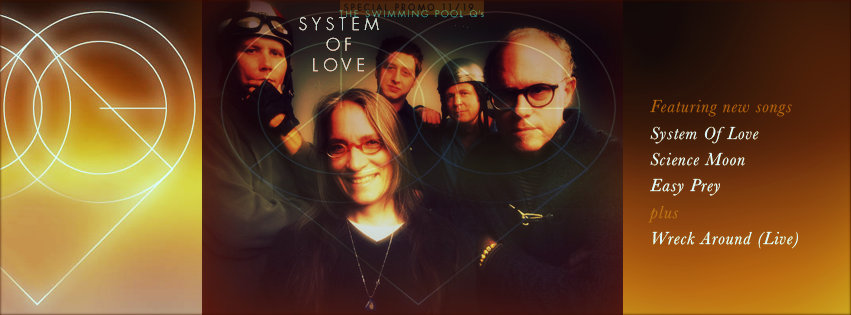System of Love EP by The Swimming Pool Q's- MP3 Album
Royal Academy Press > The Village Voice (1) > The Village Voice
The Village Voice
The Center of the Solar System, Deep in the Hot of Atlanta Q's Love the Sun
by Richard Gehr August 13 - 19, 2003
The Swimming Pool Q's, Royal Academy of Reality, Bar None
"Her light has been delayed" are the first words sung by Jeff Calder on a record a decade or more in the making, by a band that's soldiered on in fits and starts since new wave's sideways-haircut heyday. It's been worth the wait. Royal Academy of Reality is an ambitious and successful summer blockbuster of a release, a shimmering album-qua-album of earthy origins and lofty metaphysical aspirations that make it a little easier to drag your mildly depressed, overworked, or underemployed carcass out of bed every morning for another day in the fields.
Who loves the sun? The Hotlanta-based Calder and Q's, for starters, with at least as much fierce devotion as the Beach Boys at their height. And by golly there's the late Sun Ra drummer Samarai Celestial, too-not to mention Moe Tucker, banging her green tambourine on "The Wheel of the Sun," one of the album's many glorious odes to the solar system. The seeds of the Q's sexy tour de force were sown on their scrappy 1980 Old South putdown, The Deep End (reissued, with hilarious Calder annotations, in 2001). In "Overheated," one of that album's many goth-mocking character studies, singer Anne Richmond Boston inhabits a sickly girl in a prickly nightgown who gets "overheated . . . and stuff" while watching boys play outside her window.
Two decades later, Calder nests lines like "The earth makes us feel things, 'cause the center of her is hot" in a storm of steamy celestial avant-arena rock. At Royal Academy's heart is "Deep South," a hot, moist six-minute canoe ride via lush Pet Sounds harmonies into a delta lady's, uh, delta. Where The Deep End packaged pithy and punchy short stories inspired at least in part by former Calder professor Harry Crews, you can hear Royal Academy as a surreal novel about heat, light, and electricity; the earth, moon, sun, and stars; and the eternal feminine. Royal Academy runs rife with such apercus as "a world that's a ruse and also a rose" and "out of the dark and chaos comes the rush." It's an anthem of the sun that would bust out in blows against the empire if anyone had the energy to launch a wooden ship, much less a rocket; the saucers descend nonetheless in "Out of Nothing."
Calder and the Q's did radio-ready romance on 1986's Blue Tomorrow and purged their systems of mass quantities of testosterone on 1989's World War Two Point Five. Calder's consistently literate lyrics and Bob Elsey's architectonic guitar bravado on those albums still don't quite prepare you for Royal Academy's cerebral structure and poetic detail work. The spacey electronic interludes "Cosmogonical Heliopolis" and "Nocturnal Transmissions" divide the new album's 20 tracks into a 70-minute, three-part arc that rises from the earth through an atmosphere thick with radio and other impulses, travels deep into the Milky Way, and concludes with "Alpha Centauri's Rise." The journey is as emotional as it is soaring and astronomic. "Everybody Knows Tomorrow," "The Radio in Memphis," and "For No Reason" are all terrifically comforting rock songs as well as lonely-planet hymns to them old cosmic blues, baby.
Rock academicians crying themselves a river over Justin Timberlake would have more fun dissecting Calder's cauldron of guitars, keyboards, and various exotic jangles- an album rife with rings, saucers, orbs, and discs of dawn and dusk can't help but reflect back on its very delivery system. CDs, those light-imbued descendants of black oily vinyl, lie, for better or worse, on the cusp of extinction; The Royal Academy of Reality, among other things, illuminates the golden age of round, rotating recordings, shedding light on its own demise. The Dia Foundation should spin the disc in perpetuity, through 911 speakers, in a dedicated chamber of its lovely new Beacon facility.






